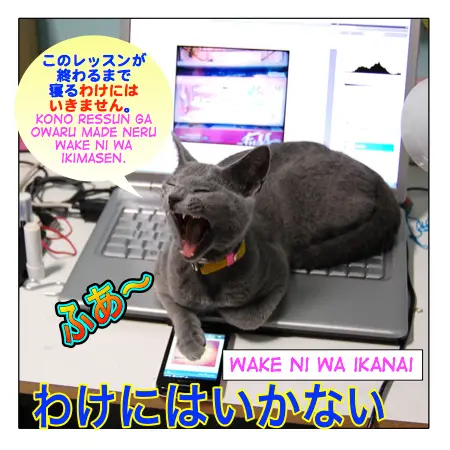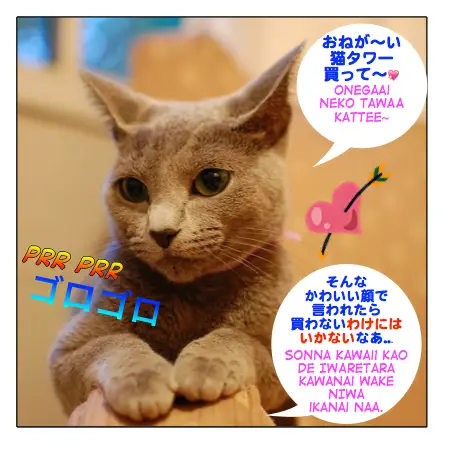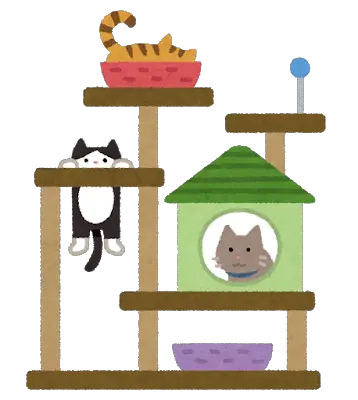
「このレッスンが終わるまで寝るわけにはいきません。」
= Kono ressun wa owaru made neru wake ni wa ikimasen.
= Until I finish this lesson, I can’t just go to bed.

「おねが~い。猫タワー買って!」
= Onegaai. Neko tawaa katte!
= Pretty pleaaaase. Buy me a cat tower.
「そんなかわいい顔で言われたら買わないわけにはいかないなあ。」
= Sonna kawaii kao de iwaretara kawanai wake ni wa ikanai naa.
= If you ask me with that cute face, I have no choice but to buy you one.
/ How can I not buy one if you ask me with that cute face?
Hi everyone! I am your guest teacher, Malina, from São Paulo, Brazil.
I secretly volunteered to be a guest teacher to surprise my human buddy who has been studying Japanese.
OK, today’s lesson is how to use わけにはいかない ( = wakeni wa ikanai)
わけ ( = wake) means “reason” but there are many expressions with わけ ( = wake)
Maggie made a lesson on わけではない & わけがない ( = wake dewa nai & wake ga nai) a long time ago.
Today I am going to teach you other usages.
★How to form:
Verb* + わけにはいかない ( = wake ni wa ikanai) / (polite) わけにはいきません ( = wake ni wa ikimasen) / (more polite) わけには参りません(= wake ni wa mairimasen.)
verb: plain form / negative form / progressive form / passive form / causative form + ~ておく ( = teoku) / Vてしまう( = teshimau)/ Vてもらう/あげる ( = te morau / ageru) ,etc.
★When to use:
Under certain circumstances/ due to some reason* you can’t afford to do ~ / you have no other choice but to do ~.
*The reason can be one’s personal reason, moral, common sense, socially accepted idea, or one’s sense of justice.
You usually use the negative potential form when you simply can’t do something you use
a) 明日は会社を休めません。/ 休むことができません。
= Ashita wa kaisha wo yasumemasen. / yasumu koto ga dekimasen.
= I can’t take a day off from work tomorrow.
→It simply tells the fact that you can’t.
or なければならない ( = nakereba naranai ) / いけない ( = ikenai) = have to do something / must do something (obligation)
b) 明日は会社に行かなければなりません。
= Ashita wa kaisha ni ikanakereba narimasen.
= I have to go to work tomorrow.
→It expresses one’s obligation. You have to do so because of obligations / rules.
わけにはいかない ( = wakeniwa ikanai) involves one’s strong will.
b) 明日は会社を休むわけにはいきません。
= Ashita wa kaisha wo yasumu wake ni wa ikimasen.
= I have no choice but to go to work tomorrow. / There is no way that I can take a day off from work tomorrow.
→Though I want to take a day off, I have no other choice but to work tomorrow due to certain circumstances
(Ex. important meeting, someone important is coming, etc.)
It shows your strong determination or your will under some unavoidable circumstances.
d) 今日は何も食べられません/食べることができません。
= Kyou wa nanimo taberaremasen / taberu koto ga dekimasen.
= I can’t eat anything today.
e) 今日は何も食べるわけにはいきません。
= Kyou wa nanimo taberu wake ni wa ikimasen.
= I am not going to eat anything today. There is no way that I’ll eat anything. (I’m determined.)
The listener can tell the speaker (e) has some important reason why he/she can’t eat today and is determined not to eat today.
This expression is a bit dramatic so you would not use this expression if the reason you won’t eat is simply, “I am not hungry.”
🔹From the picture above:
「このレッスンが終わるまで寝るわけにはいきません。」
= Kono ressun wa owaru made neru wake ni wa ikimasen.
= Until I finish this lesson, I can’t just go to bed.
It shows my strong will because I am a very responsible cat.
**
Ex. あのチームに負けるわけにはいかない。
= Ano chiimu ni makeru wake ni wa ikanai.
= We can’t afford to lose to that team.
Ex. せっかくもらったサインを人にあげるわけにはいかない。
= Sekkaku moratta sain wo hito ni ageru wake ni wa ikanai.
= I went to all the trouble getting this autograph. There is not way I’m going to give it to someone else.
Ex. こんな小さい子供を一人で留守番させるわけにはいかない。
= Konna chiisai kodomo wo hitori de rusuban saseru wake ni wa ikanai.
= There is no way that I can let this small child stay home by him/herself.
Ex. 結婚式にこんなダサい服を着るわけにはいかないから新しい服を買いに行かなくっちゃ。(casual)
= Kekkonshiki ni konna dasai fuku wo kiru wake niwa ikanai kara atarashii fuku wo kai ni ikanakuccha.
=There is no way I’m going to wear these dorky clothes to the wedding so I have to go buy new clothes.
Note: ダサい ( = dasai) is a slang word meaning “dorky”, “nerdy”, or “unfashionable”.
Ex. あんなひどいことを言われてもう黙っているわけにはいかない。
= Anna hidoi koto wo iwarete mou damatte iru wake ni wa ikanai.
= They/He/She said such a horrible thing to me that I can’t afford to keep my mouth shut anymore. (I have to do something)
Ex. いつまでも泣いているわけにはいかない。前を向いて歩こう。
= Itsumademo naite iru wake ni wa ikanai. Mae wo muite arukou.
= I can’t just keep crying forever. I’ve got to get on with my life.
Ex. そんな雑用をマギー先生にさせるわけにはいきません。私達がすべてやります。
= Sonna zatsuyou wo Maggie Sensei ni saseru wake ni wa ikimasen. Watashitachi ga subete yarimasu.
= We can’t let Maggie Sensei do those kinds of chores. We will do everything.
From Maggie Sensei: ありがとう!次はマッサージしてね。( = Arigatou! Tsugi wa massaaji shite ne.) = Thank you guys! Now give me a massage next. :)
Ex. 上司の誘いを断るわけにはいかないよ。
= Joushi no sasoi wo kotowaru wake ni wa ikanai yo.
= I can’t do anything but accept the invitation from my boss.
Ex. あの人を許すわけにはいかない。
= Ano hito wo yurusu wake ni wa ikanai.
= I can’t afford to forgive him/her.
*そういうわけにはいかない ( = sou iu wake ni wa ikanai) = I can’t do that/ Things don’t work that way. / No way
Ex. 「ねえ、お金なければお姉さんに借りたらいいじゃない。」
= Nee, okane nakereba oneesan ni karitara ii janai.
= Hey, if you don’t have money, why don’t you ask your big sister to lend you some?
「この間、一万円借りたばかりだからそういうわけにはいかないよ。」
= Kono aida, ichiman en karita bakari dakara sou iu wake ni wa ikanai yo.
= No way. I just borrowed 10,000 yen from her.
Note: You can also say
→また借りるわけにはいかないよ
= Mata kariru wake ni wa ikanai yo
Ex. 「あっ、傘ないの?この傘を持っ行っていいよ。返さなくていいからね。」
= Ah, kasa nai no? Kono kasa motte itte iiyo. Kaesanakute ii kara ne.
= Hmm you don’t have an umbrella? You can take it with you. You don’t have to return it, OK?
「そういうわけにはいかないよ。今度会った時に必ず返すからね。サンキュー!」
= Souiu wake niwa ikanai yo. Kondo atta toki ni kanarazu kaesu kara ne. Sankyuu!
= Oh, no way, (I can’t do that.) I will be sure to return it to you when I see you the next time. Thanks!
Note: You can also say
→返さないわけにはいかないよ
= Kaesanai wake ni wa ikanai yo
Polite form: わけには参りません ( = wake ni wa mairimasen)
Ex. また、ご馳走していただくわけには参りません。今度は私がご馳走いたします。(polite)
= Mata, gochisou shite itadaku wake ni wa mairimasen. Kondo wa watashi ga gochisou itashimasu.
= I can’t let you pay for my food again. I’ll treat you this time.
★ verb negative form Vないわけにはいかない ( = V nai wake niwa ikanai)
You have to do something under certain circumstances / due to some reason you have no choice but to do something
⭐️ From the picture above:
「おねが~い。猫タワー買って!」
= Onegaai. Neko tawaa katte!
= Pretty pleaaaase. Buy me a cat tower.
「そんなかわいい顔で言われたら買わないわけにはいかないなあ。」
= Sonna kawaii kao de iwaretara kawanai wake ni wa ikanai naa.
= If you ask me with that cute face, I have no choice but to buy you one.
/ How can I not to buy one if you ask me with that cute face.
Ex. ずっと楽しみにしていた旅行だから熱があっても行かないわけにはいかない。
= Zutto tanoshimini shite ita ryokou dakara netsu ga atte mo ikanai wake niwa ikanai.
= I have been looking forward to the trip so even though I have a fever, I have to go no matter what.
Ex. 部下とお酒を飲みにいったらおごらないわけにはいかない。
= Buka to osake wo nomi ni ittara ogoranai wakeni wa ikanai.
= When I go out for a drink with my subordinates, I gotta pay their drinks.
Ex. 明日はお客さんが来るから掃除をしないわけにはいかない。
= Ashita wa okyakusan ga kuru kara souji wo shinai wake ni wa ikanai.
= Since we have guests coming tomorrow, I have no choice but clean the house.
Ex. いずれ、娘の彼氏に会わないわけにはいかないなあ。
= Izure, musume no kareshi ni awanai wake ni wa ikanai naa.
= I have no choice but to see my daughter’s boyfriend at some point.
Ex. 会社のイベントだから出ないわけにはいきません。
= Kaisha no ibento dakara denai wakeniwa ikimasen.
= Since it is a company-related event, I have no choice but to attend.
***
★わけにもいかない ( = wake ni mo ikanai )
わけにもいかない ( = wake ni mo ikanai ) and わけにはいかない ( = wakeniwa ikanai) mean almost the same and in most cases they are interchangeable.
わけにはいかない ( = wakeni wa ikanai) expresses one’s will more strongly.
Ex. A「疲れているんだったら明日、休んだら?」
= Tsukarete irun dattara ashita, yasun dara?
= If you are tired, why don’t you take tomorrow off?
B「そういうわけにはいかないよ。」
= Souiu wake ni wa ikanai yo.
= I can’t do that / It doesn’t going to work that way.
C「そういうわけにもいかないよ。」
= Souiu wake ni mo ikanai yo.
= I can’t do that/ It doesn’t work that way.
The translation is the same and the difference is very subtle but B denies the possibility of taking a day off clearly. ( You show your will more clearly)
Ex. D: 明日、休むわけにはいかない。
= Ashita, yasumu wake ni wa ikanai.
= I can’t just take a day off tomorrow.
Ex. 明日、休むわけにもいかない。
= Ashita, yasumu wake nimo ikanai.
= I can’t do something like take a day off.
→It implies “taking a day off” is one of the options.
Note:
わけにもいかなくて ~ / いかないので ( = wake ni mo ikanakute / ikanai node ~ )
→ わけにもいかず ~ ( = wakeni mo ikazu ~ ) more literal
なくて ( = nai) / ないので ( = nai no de) change to ず ( = zu) or ずに ( = zuni) in more literal sentence.
Ex. 困っている人を見捨てるわけにもいかず助けてあげた。
= Komatte iru hito wo misuteru wakeni mo ikazu tasukete ageta.
= I couldn’t just ignore a person who was in trouble so I helped him/her.
***
(casual) Vわけにはいかない? ( = wakeni wa ikanai?)
(polite) Vわけにはいきませんか ( = wakeni wa ikimasen ka)
(more polite) Vわけには参りませんか ( = wake ni wa mairimasen ka)
When you persuade someone to do something for you. / to negotiate doing something.
V わけにはいきませんか?
= V wake ni wa ikimasen ka?
= I wonder if it is possible for you could do something for me?
→I know it’s difficult but is there any way you could do something for me/us? / I wonder if it’s possible to do ~.
You usually use this expression when you know it is difficult but you are desperate and ask for a favor. So you don’t use it for minor favors.
Vてもらう( = V te morau) /Vていただく ( = shite itadaku) + わけにはいきませんか? ( = wake ni wa ikemasen ka?) / (casual) わけにはいかない? ( = wake ni wa ikanai? )
Note: You may not see a question mark “?” used in sentences like this.
Ex. 少しだけでもお話を聞いてもらうわけにはいきませんか?
= Sukoshi dake demo ohanashi wo kiite morau wakeni wa ikimasen ka?
= Can you listen to me even a little?
Ex. なんとか助けていただくわけにはいきませんか?
= Nanto ka tasukete itadaku wake niwa ikimasenka?
= Is there any way that you could help me?
Ex. 明日、車を貸してもらうわけにはいかないかなあ。
= Ashita, kuruma wo kashite morau wake niwa ikanai kanaa.
= I wonder if it’s at all possible for you to let me use your car tomorrow.
Ex. 私共にこのお仕事を任せていただくわけには参りませんでしょうか。(polite)
= Watashidomo ni kono oshigoto wo makasete itadaku wake ni wa mairimasen deshou ka?
= Would you please consider letting us take care of this job?
OK, that’s all for now. Thank you for reading my lesson!
Do you think I will get a new cat tower?
*****
 マギー先生より = Maggie Sensei yori = From Maggie Sensei
マギー先生より = Maggie Sensei yori = From Maggie Sensei
ありがとう、Malina先生!
= Arigatou, Malina Sensei!
= Obrigada, Malina Sensei!
I am surprised to know that you use the same technique that I used to use. When I want something, just look into the target’s eyes with my lovely puppy eyes…
They just can’t say “No”.
***
I REALLY appreciate your support! サポートありがとう!
My supporters can access an audio file for this lesson on my Patreon page and some mini lessons and quizzes.
Audio File for this lesson
![]() Part 1 Click here.
Part 1 Click here.
![]() Part 2 Click here.
Part 2 Click here.

11 Comments
Hi Maggie! Here I am again, studying all your lessons!
I would like to know why you used the particle をin these sentences:
a) 明日は会社を休めません。/ 休むことができません。
= Ashita wa kaisha wo yasumemasen. / yasumu koto ga dekimasen.
= I can’t take a day off from work tomorrow.
b) 明日は会社を休むわけにはいきません。
= Ashita wa kaisha wo yasumu wake ni wa ikimasen.
= I have no choice but to go to work tomorrow. / There is no way that I can take a day off from work tomorrow.
****
because I thought that 休む was a intransitive verb, wich means that we can’t use the particle を
Hi Eliza
休む is used as both transitive and intransitive verb
家で休む = to rest at home = intransitive verb
授業/学校・会社・+を休む = to skip the class/work
マギー先生、ありがとうございます!
Sensei Maggie I am going to take the JLPT-N4 what should I study first..? The kanji the vocabulary or the sentence patterns.?
I would say everything but if you don’t have so much time to study, you can learn kanji and vocabulary when you study sentence patterns or reading.
がんばって!
Konnichiwa, Maggie-sensei!
What about words such as “グッスリ” or ”すっかり”, is there a specific name for these words?
Those are called 副詞(ふくし)adverbs
ありがとうございます、先生!
どういたしまして!
Konnichiwa, Maggie-sensei!
I love all your lessons and they help me a lot! I want to ask you, is there a specific name for words such as “fuwa fuwa” or “peko peko”? Do you have any lessons on it?
Thank you!
Hi Felita,
Those are called 擬音語(ぎおんご)/ 擬態語(ぎたいご)
I don’t have a lesson here but I once in a while teach those on Twitter. (Actually I just taught fuwafuwa today) 😊
Search on Twitter typing the word
“Onomato4Day” +maggiesensei. You will see the past tweets.